Oct 24, 2017 | Featured, School Trips
By Madeline Skapper (IV) and Martha Lewand (IV)
On Wednesday, September 6, the sophomore class embarked on their Form IV trip to New York City to visit the American Museum of Natural History and view the award-winning Broadway musical, Groundhog Day.
Students travelled from Pingry to New York City by bus, where they would begin their day at the museum. Shortly after arriving, advisories competed in a scavenger hunt that took them to different exhibits throughout the museum.
The scavenger hunt had clues and riddles to find objects in different exhibits of the museum. The team or advisory with the most correct answers to the riddles received the highest amount of points, enabling them to place somewhere in the top three–provided that their team name was judged worthy. Once the entire grade gathered back together, the winners received their medals in a short ceremony and everyone headed off to lunch.
After lunch at the museum, the sophomores boarded their buses to see the Broadway play Groundhog Day at the August Wilson Theatre. Students were given tickets and sat with their advisory groups to watch the matinee performance of the show.
Groundhog Day, based on the 1993 movie of the same name, focuses on a weatherman named Phil Connors (Andy Karl), who travels to Punxsutawney, Pennsylvania to cover the annual emergence of the groundhog. His exit from the town goes awry when all of the roads are blocked, and he is trapped in a blizzard. Waking up the next morning, he realizes he has been trapped in a constant loop of the same day. Through this ordeal, Phil gets to know associate TV producer Rita Hanson and learn the stories of the other people in the town. Through Phil’s struggle to finally get the day “right,” he grows as a character and gains a new perspective on life which would not have been possible without his tribulations on Groundhog Day.
After the performance, the students and teachers got back on the buses to return to Pingry. Overall, the sophomores enjoyed their day in New York City, reuniting with friends before the school year officially began.
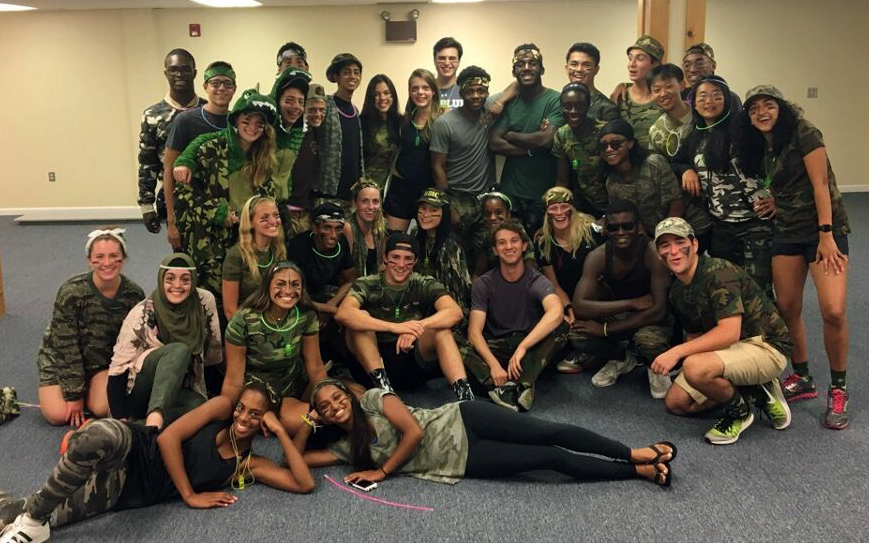
Oct 24, 2017 | Featured, School Trips
By Ouarida Benatia ’18 and Calvary Dominique ’18
From August 30 to August 31, the annual Freshman Retreat was held at the Bryn Mawr Mountain Retreat and Conference Center in Honesdale, Pennsylvania.
The peer leadership program, a part of the Pingry tradition for the past thirty three years, is designed to to make the middle school to high school transition less daunting for freshmen. Transitioning from middle school into high school is one of the most challenging and exciting times in one’s life. Especially at a school like Pingry, where academic and personal excellence are stressed, there is a pressure to perform perfectly in and out the classroom. Freshmen also need to learn how to manage their newfound free time wisely so that they do not fall victim to procrastination. Without a strong support system, all the pressure can seem overwhelming.
Giancarlo Castillo (VI), a peer leader, remarks that “the most special thing about peer leadership is that the class helps [everyone] grow not only as leaders but also as people.” There are thirty-six peer leaders who are split into eighteen pairs; each pair mentors a group of about eight freshmen. This year’s advisors are Mrs. Ostrowsky, Mr. Ross, and Mr. Murdock, who run the discussions and activities for the class. After the peer leaders bonded during their own retreat in June, the freshman retreat was meant to establish a strong bond between seniors and freshmen.
Upon arrival at Bryn Mawr at the start of the retreat, each peer group made a flag symbolizing their group. The first activity was generally focused on getting the everyone into the habit of working together within their groups. The rest of the day was devoted to team-building activities including making a protective device for an egg drop, building a carriage that could withstand the weight of a person for a carriage race, making a catapult, and going through the “Gauntlet,” a timed obstacle course which could only be completed with the teamwork and contribution of every person in a peer group. After dinner, it was time for the dance. As soon as the DJ played the song “Who Let The Dogs Out” by Baha Men, the peer leaders rushed out to surprise the freshmen and began engaging everyone in the dance. The spirit was truly infectious, and a lot of the freshmen began to let go of their reservations and start having fun. The next day of the trip was game day. Anxiety filled the air as the peer groups launched their catapults, dropped their eggs, raced their carriages, and heard the results of the Gauntlet race. Alex Kaplan (III) said he liked “the building part because [everyone] put their heads together and sourced [the] idea for the chariot and made it all together, which was a good time.”
In sharp contrast from that exciting atmosphere, everyone boarded the buses for a relaxing trip back to Pingry. Kayley Taylor (III) says that peer group has definitely helped her transition to the high school and that “it’s better that we have one block where we don’t have to worry about anything and we can just talk to our peer leaders and actually get things done at the same time.” The freshman retreat was a clear success, and the prospective year in peer leadership is sure to be a success as well.
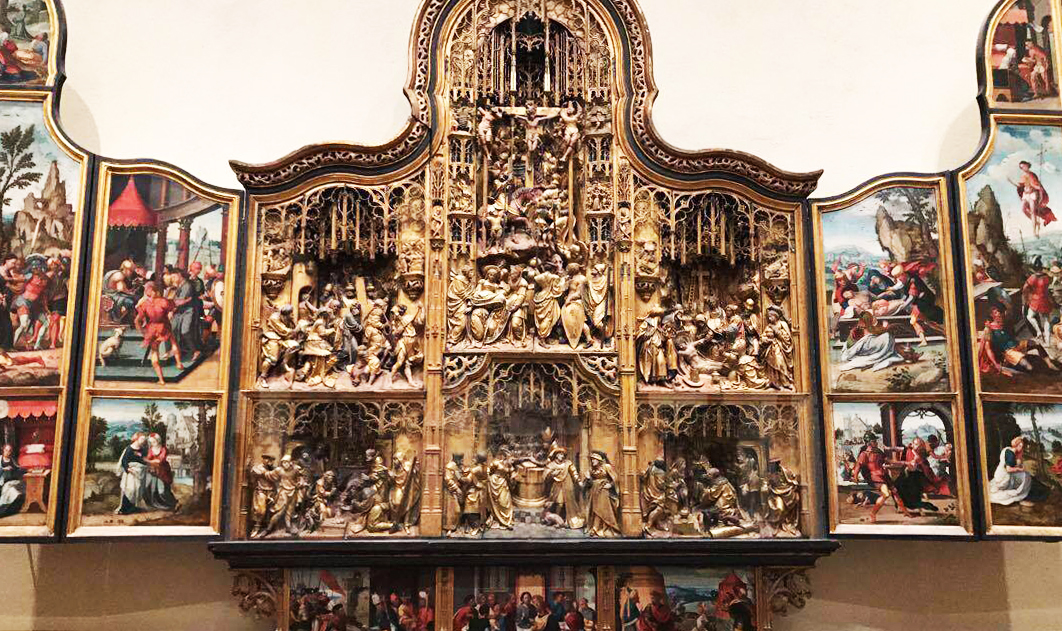
Oct 24, 2017 | Featured, School Trips
By Darlene Fung (V)
On September 6, rather than visiting the Eastern State Penitentiary as juniors have done in past years, the Class of 2019 explored the Philadelphia Museum of Art and the Museum of the American Revolution.
Students spent the two-hour bus ride catching up with peers after summer vacation, and they were ready to explore the Philadelphia Museum of Art when they arrived. Once they were given their tickets, the students were free to roam the museum, exploring rooms that contained a diverse array of art installations. One favorite display was called “Arms and Armor,” a collection of full body armor, swords, and even armor for horses. Advisor and English teacher Mr. Thomas Keating said, “The museum had such a fantastic collection. I saw my favorite artists and got to enjoy time with my students.”
After spending a few hours in the Philadelphia Museum of Art, the students enjoyed lunch at the Reading Terminal Market, choosing from a variety of food options in the bustling market, including burgers, Chinese food, Italian food, fresh deli sandwiches, several dessert options, and of course, Philly Cheesesteaks.
After lunch, the students went to the Museum of the American Revolution, which recently opened on April 19 of this year. Groups of around fifteen students were assigned a tour guide and given an interactive worksheet to fill out during the tour. Students were also given the background information of a prominent figure during the American Revolution. As they experienced the tour, students were encouraged to imagine what the revolution would have been like for their specific character.
As students walked through the museum, they watched educational videos, touched various displays, and even smelled a piece of rope that would have been used on a ship bringing goods to the New World. One interesting artifact included a punch bowl from an old tavern, which was excavated at the very site of the museum. With its pieces glued back together, one could see a picture of the Tryphena, an English brigantine ship, painted on it.
Interacting with signs that said “Please touch” and “Please smell” throughout the museum was a unique and engaging experience compared to the “Please do not touch” signs that are in most other museums. Commenting on her experience at the Museum of the American Revolution, Veronica Williams (V) said, “I really liked the interactive Revolutionary War museum. All of the videos made it very entertaining. In general, I thought the trip was a lot of fun and a great way to start the school year.”
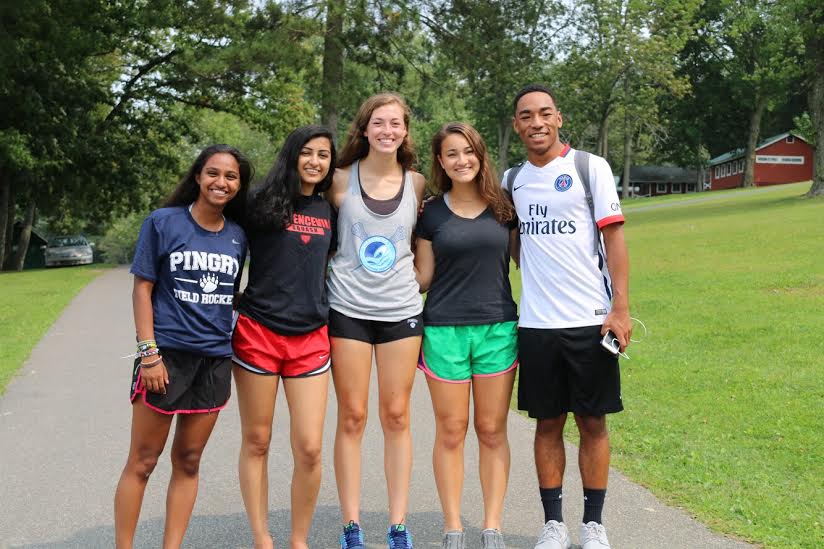
Oct 24, 2017 | Featured, School Trips
By Alyssa Chen (VI)
On September 5, the Class of 2018 boarded three buses to the Pocono Valley Resort in Reeders, Pennsylvania for their Senior Retreat, the annual overnight trip in which the graduating class bonds through fun activities and prepares for college admissions through workshops.
After arriving at noon and dropping off their bags in outdoor cabins, the students were given the remainder of the afternoon to relax, hang out with classmates, and take part in the numerous activities the resort had to offer. These activies included swimming in the pool, kayaking out on the scenic lake, playing sand volleyball, and completing the tree-top ropes obstacle course. Of the ropes obstacle course, Ethan Chung (VI) said, “It was challenging, but still doable and fun.”
Near the end of the afternoon, it started to rain. “We were lucky,” said Ryan Fuentes (VI), “because we had just enough time during the day to do all of the activities we wanted to before it started pouring in the evening.” Even with the downpour outside, the seniors continued to enjoy their afternoon with indoor activities like basketball, table tennis, and board games. Popular board games included Scattergories and Spot It!, while over twenty seniors partook in a friendship bracelet-making session led by Sehyr Khan (VI), who had brought more than enough bracelet-making thread.
After a delicious dinner served in the cafeteria of the resort, the seniors dressed up for a dance with the theme of “High School Stereotypes.” Seniors went as nerds, jocks, goths, and everything in between. After the dance, the students unwinded by making s’mores and snacking on pizza before heading back to the cabins and sleeping.
The morning was filled with hot breakfast followed by several college workshops led by Ms. Amy Cooperman, Ms. Meghan Finegan, Ms. Susan Kinney, and Mr. Timothy Lear of the college counseling department. The workshops were focused on various aspects of the college application process the seniors were about to begin, such as essay-writing and discussing the admissions office’s point-of-view.
“The college workshops were pretty helpful,” said Melissa Tungare (VI). “I understood more about what colleges were thinking. Also, the workshops made me feel better, because coming back from summer, I didn’t feel ready. But afterwards, I realized that we’re all in the same boat and that the college counselors are there to help us.”
One memorable activity had seniors act as the Pingry admissions committee, tasked with choosing only one student out of six prospective students to admit, while waitlisting and rejecting the five others. From the exercise, students learned how subjective and difficult admissions decisions can be, and that, unfortunately, schools can only admit a few students from a pool of qualified students.
Other workshops saw students reading and evaluating sample college essays while brainstorming for their own. Another workshop was led by Coordinator of Diversity and Multicultural Affairs Dr. Diana Artis, Peer Leaders, and the Student Diversity Leadership Club, in which students read about and discussed issues relating to discrimination in their lives and in the world today.
After the educational college workshops, the seniors ate one last meal at the resort, packed their bags, and boarded the buses back to school. The Class of 2018 arrived at Pingry, relaxed, excited, and ready for the first day of school and their final year of high school. As Fuentes said, “It was a great bonding experience and I thought it was a perfect end to the summer.”
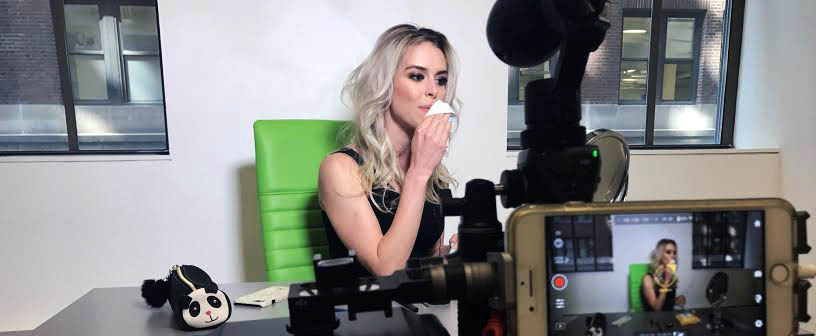
Oct 24, 2017 | Featured, Summer Experiences
By Miro Bergam (V)
Early last summer, I embarked on my first foray into the professional working world. Dressed in my business casual best and armed with a shiny new MetroCard, I hopped on the 7:30 A.M. train for the first day at my internship with a video journalism company down the street from the New York Stock Exchange.
After series of newbie mistakes—buying a ticket to Newark Penn Station instead of New York Penn Station, walking up Wall Street at least five times before finding my building, forgetting a photo ID, etc.—I arrived thirty minutes late to my office feeling even more daunted than before. I expected nothing less than a stuffy, time-crunching work environment run by an exacting boss, who would be annoyed by my tardiness on the first day.
Upon arrival, I was astonished to find that I was earlier than my boss. When he arrived, he apologized for his lateness, saying he was exhausted from a weekend of surfing. Before he showed me what I would be working on for the next month, he insisted on having coffee with me so we could learn more about each other. I’m not sure whether it was the relaxed manner of my boss and coworkers or the massive poster of an almost-naked Howard Stern on the wall near my desk, but I could tell that this job was not going to be the stereotypical, stringent, Wall Street experience I had expected.
That’s not to say my work wasn’t highly rigorous and educational. Over the course of my internship, I learned about the production of video journalism at all of its stages. I operated several different advanced cameras, used advanced editing software, and distributed videos to our third party buyers. Beyond these technical skills, I wrote and reported on reputable news stories. I also learned about finance through my multiple visits to the NASDAQ and New York Stock Exchange.
The casual and colorful environment under which I worked optimized my learning and made for a positive experience to which I would be eager to return. My boss made a point of this to me; he told me that he would rather his employees come to work happy than punch in a card on time, so long as all the work (around 15 videos per day) got done. He always emphasized the importance of loving one’s job, telling me how he had left his job on the Stock Exchange to pursue journalism. He said that although his previous job had been more lucrative, he had chosen to follow what made him happy. His choice to run his business in an easygoing, lively way reflects that same desire for all his employees to come to work with a smile on their face. The functionality of this work model really shone through when one of the reporters had a crisis at home. Thanks to the compassion of my boss and coworkers, the reporter took as much time off as she needed to handle the incident, as the rest of the employees gladly filled in for her. If the workplace were not run so leniently, I doubt anyone would have been as eager to help out, and the reporter would have had to compromise either her work or deal with the issue at home. However, since the company had been understanding in their times of need, the employees readily offered to fill in.
I came away believing that the style in which my boss leads his company should be applied to our lives at Pingry. On a personal level, this translates to how students allocate their time. I know how hard it is for Pingry students to quit anything; it took me several years to quit swimming, an activity I started out of obligation instead of interest. However, as my boss taught me in regard to his old job, doing something you dislike is neither productive nor sustainable, and pursuing what you are passionate about will optimize happiness and mental health.
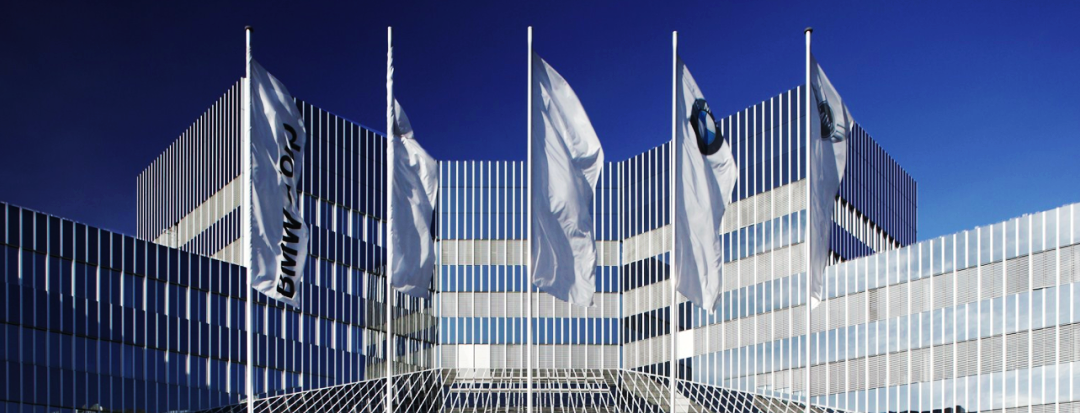
Oct 24, 2017 | Featured, Summer Experiences
By Nicole Kloss (V)
Ever since I was a young child, I have visited my family in Germany every year. I used to love running around the quaint town of Schwabisch Hall, splashing my feet in the Kocher River, and playing mini golf tournaments with my cousins. Over my years of spending time in Germany, my love for the country and its culture has grown, which drove me to apply for a couple of internships in Germany this summer. However, the internship that stood out to me the most was one for BMW.
BMW, the Bayerische Motoren Werke, is a successful car company founded and located in Munich, Germany. The luxury car company is a large part of German culture and I was honored to have the opportunity to contribute to this amazing company. After being accepted to intern in the contracting department at BMW, my uncle and his family helped make the opportunity a reality by offering their home for me to stay in for one month.
Towards the end of June, I packed a suitcase full of business casual clothing, got on a plane with my family, and flew to Germany in anticipation for my internship. When we arrived at the airport, my mom and sister drove two hours west to Schwabisch Hall, and my dad and I drove two hours south to Munich. After arriving in Munich, my dad helped me settle in and I caught up with my extended family. However, it was not until the next morning, when my dad had already left for Schwabisch Hall, that I realized how independent I would have to become.
At home, my parents care a lot about my safety. They don’t want me to use public transportation alone, stay out late, or even walk around New York City by myself. But without my parents around, I had to adapt to my new independence. Along with becoming independent, I was determined to make the most out of my internship at BMW.
On my first day of work, my uncle explained to me how to get to BMW. Following his instructions, I walked from his house to the subway station, bought a subway ticket, boarded the U2 subway, and was finally on my way to BMW.
After the thirty-minute ride, I stepped out of the subway station. Directly in front of me was a large, sleek BMW building. I quickly realized that this building was where I would work, and I was stunned. I walked through the revolving doors and met Selin, a college intern whom I was to shadow. As I followed her towards our department, I was surprised by the amount of people I passed by. I later learned that tens of thousands of people work in that building alone.
When we got to our office, Selin showed me around the contracting department, gave me a desk, and explained what was expected of me. My duties included speaking only German and working from 8am to 4pm every day. Selin then gave me a tour of BMW through BMW’s employee bus service. The area BMW occupies is much larger than I had imagined, as the building I first saw occupies only a small area. I saw several large factory buildings and Selin even brought me to the nineteenth floor of the BMW headquarters. She then led me back to our office and gave me PowerPoint presentations to read about BMW and their history. I also learned a lot about the contracting department. After a long day, I took the subway back home. I was exhausted and went straight to bed.
Although my first day at BMW was overwhelming and required a lot of independence, my excitement to intern at a company I was passionate about continued during the time I was there. As an intern, I completed many tasks including translating contracts, filing contracts into excel sheets, and attending meetings with potential suppliers. I also experienced a factory tour.
My internship at BMW has helped me mature and I am grateful to have had a wonderful opportunity to learn more about German people, experience their culture, and be a part of the working environment at one of the most successful companies in the world.
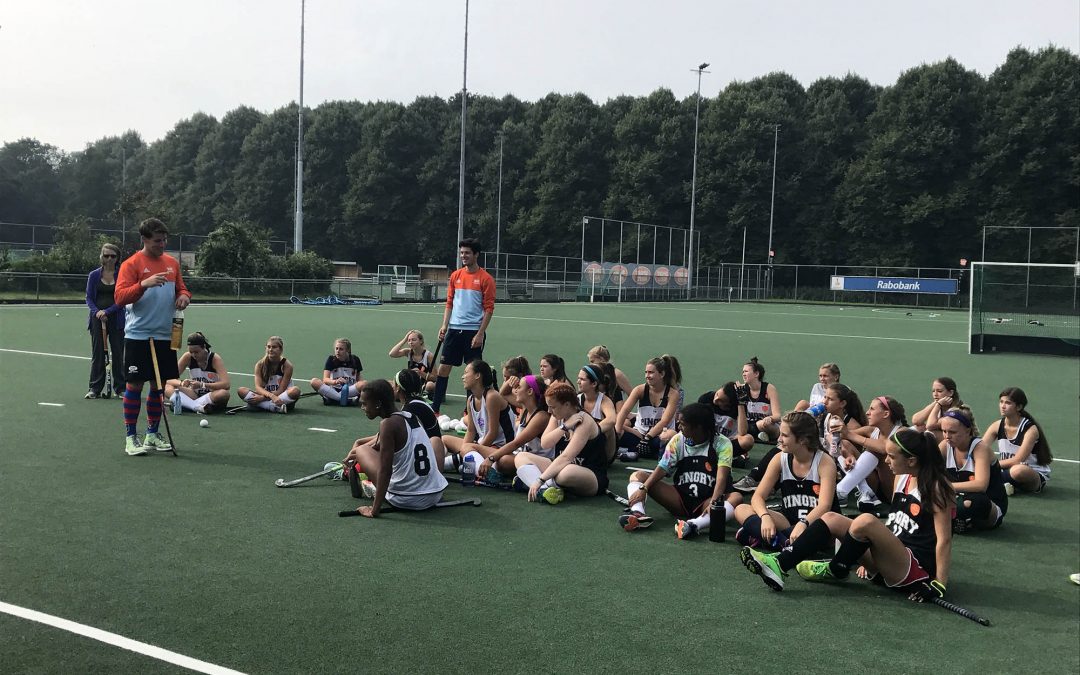
Oct 24, 2017 | Featured, Summer Experiences
By Shruti Sagar (VI)
More than two dozen field hockey sticks and giant harrow backpacks were piled on top of each other as we checked in at the Newark airport. I started to feel overwhelmed by the fact that this trip was actually happening. It was less than a year ago that my field hockey friends and I were joking around with our coaches about taking a team trip to Holland, so the fact that I was starting my senior year traveling to Europe with my best friends was still hard to believe. After weighing our bags, waiting in a long security line, and scrambling for last minute snacks, twenty-eight girls and four coaches boarded our evening flight to Amsterdam.
We arrived in Holland early in the morning and immediately boarded a bus to our home for the next nine days. Our team stayed in villas filled with common areas where we spent our time together every night. After dropping off our bags, we hit the ground running with a full day of sightseeing in the Dutch countryside. We were able to try Dutch pancakes, explore windmills and bakeries, and gain familiarity with the sights and sounds of Holland. We continued sightseeing the next day as we ventured into the capital city of Amsterdam. We spent our day touring Anne Frank’s house, shopping and exploring in smaller groups, and taking pictures in front of the beautiful buildings and elaborate canals.
After two full days of exploring Holland, it was time to finally play some field hockey. We each rented a bike and rode through the forest in the rain to the field hockey club where we would train. Field hockey clubs in the Netherlands are synonymous to country clubs in America; they have endless amenities and allow for athletes to socialize while practicing their skills using state-of-the-art facilities. We met our Dutch coaches, who became our friends and role models during our days of training. Their expertise and humor kept us entertained and working hard. We still reminisce about their jokes daily.
We fell into a routine while training that the team would come to love and miss once we came home. We hopped on our bikes each morning, sore from the previous day and bundled up in sweatshirts because of the windy, rainy weather.
We practiced with our Dutch and Pingry coaches for a few hours each day; then we took a break for lunch, which almost always consisted of sandwiches. The Dutch coaches introduced us to a couple of their favorite sandwich combinations, like peanut butter and chocolate sprinkles. After lunch, we would get back on our bikes to play a few more hours of field hockey. We also played in international matches with and against Dutch and international field hockey players. These athletes were incredibly skilled and agile, and it was amazing to see the differences in technique compared to American teams. One night, we were even able to watch the Dutch national team compete in a friendly match against India. Many of us had never seen field hockey at this caliber, and we were stunned watching their speed and flawless passing.
Throughout our trip, our coaches set phone restrictions for us that allowed us one hour of phone time each day; when we were touring and playing field hockey, our phones were to stay turned off in the villas. When we first heard about these phone restrictions, many of us felt uneasy about staying “unplugged” in a foreign land, but after nine days full of dance parties, solving a thousand-piece puzzle, deep talks, and endless rounds of elephant master and card games, many of my teammates reflected on the no phone policy as a positive experience. Because of our efforts to live in the moment, we were able to immerse ourselves in new perspectives and cultures, creating an unforgettable experience that will remain a part of Pingry field hockey for years to come.
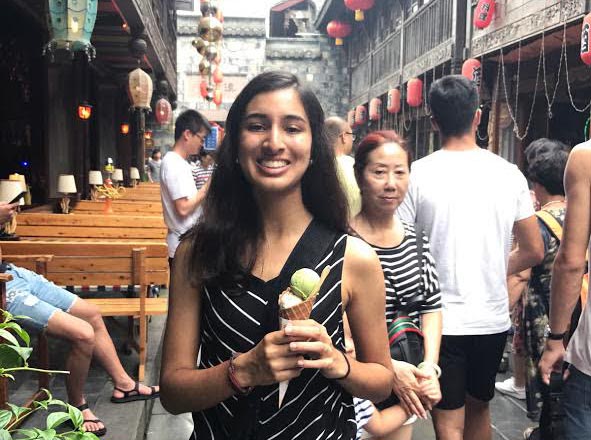
Oct 24, 2017 | Featured, Summer Experiences
By Alisa Chokshi (V)
This past summer, I was fortunate to receive a National Security Language Initiative for Youth (NSLI-Y) scholarship from the US State Department for a language and cultural immersion program in China. NSLI-Y’s goal is to help prepare American citizens to be leaders in a global world by helping students gain critical language skills and cultural knowledge to promote communication between countries. The Chinese language has always fascinated me with its complex characters and tones. As an aspiring polyglot, I thought this would be the perfect opportunity to learn it.
I became part of a group with 27 other teenagers who turned into family over the course of six weeks.
The program offered the unique chance to communicate with Chinese people from all walks of life, such as the ones I met and befriended on domestic flights, my host family, teachers, peer tutors, the elderly, young children, shopkeepers, and waiters.
From climbing the Great Wall to swooning over cute pandas, from having a traditional farm lunch in the countryside to crashing Chinese weddings, I was truly immersed in the local Chinese culture, an experience unlike anything I could have imagined.
My excitement made my host family appreciate their culture even more. Wednesday was my favorite day of the week because we had morning language classes and then spent the rest of the day on a cultural excursion to usually do community service. I volunteered at a kids’ summer camp, helped out at senior citizen centers, and taught young children English.
On one particular Wednesday we went to Huang Long Xi, a famous ancient town that has a river flowing through it. There were hundreds of Chinese people playing around in the water, and my friend and I tried to stay away to avoid getting soaked. Unfortunately, this was not so easy. As my friend was taking a picture of me, a man came up behind us and soaked us with a bucket of water. We were annoyed, but at the same time, we realized we were getting the authentic experience.
Among my favorite times were the weekends when my host family and I would go on long road trips to a different cities, exploring their history and culture. Overall, I went to six different cities over the course of six weeks. In the end, I was in tears at the Chengdu airport. Saying goodbye to my host mother and sister was so difficult.
I have a lot to think about now that I’m back in America.
During the first week in Chengdu, I remember hearing a thought-provoking statement during our visit to the US Consulate. A representative had told us that the relations between two countries are built on people-to-people interactions more so than exchanges between media, government, etc., and I remember thinking that this concept was so simple yet so powerful.
After finishing my program, I can now say with certainty that the people-to-people interactions I had with Chinese people were the most rewarding part of my experience. Whether it was joking around with my Chinese friends, having meaningful discussions with my host family, or simply bargaining with shopkeepers in Chinese, I broke down many stereotypes and gained a true appreciation for China and its deep culture.
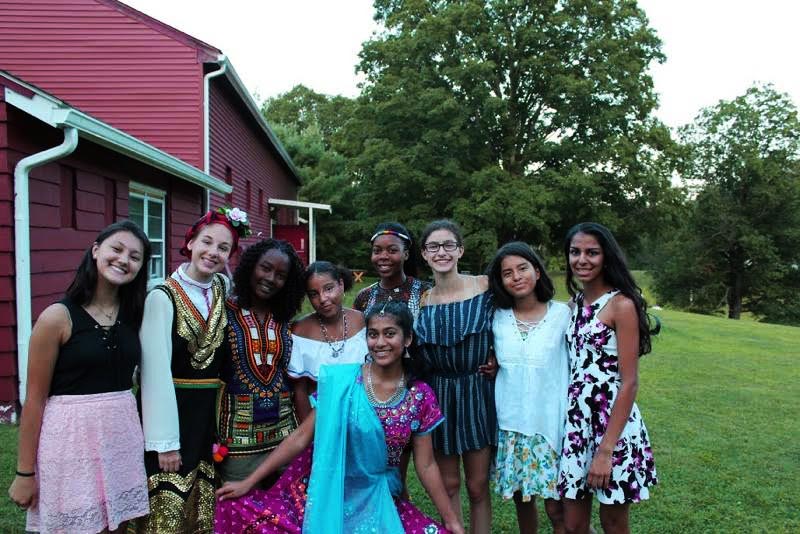
Oct 24, 2017 | Featured, Summer Experiences
By Anjali Kapoor ’20
It was 2 AM and I was alone in the woods. Under the stars and next to a fire, I stayed up all night writing a letter to my 21-year-old self. It was vigil night—a camp tradition since 1930. Camp Rising Sun is a full scholarship international leadership camp that I attended this summer in Rhinebeck New York.
Growing up I always heard the term “diversity,” but this camp was diverse on a whole new level. I got to meet girls from over 30 countries in North and South America, Europe, Africa, Asia, and the Middle East. In fact, a couple of my best friends at camp were from Israel, Korea, and Spain! We received instructions about academics, art, or culture every day, led by campers or counselors. One of my favorite instructions was by a Spanish camper who taught us a Spanish dance, el candil. In another instruction, a counselor who is an acrobat at a circus taught us how to do tricks on the silks. I learned cultural dances, listened to new music in different languages, and tried food from all over the world. One girl described camp as a way to “travel around the world without going anywhere.”
Another fun part of camp was being sachem. Sachem is a Native American term for chief or leader, and the sachem gets to run camp. I was chosen as sachem of our wilderness trip, a three-day hiking and camping trip at another campsite. At the campsite, we cooked by fire and sang our favorite songs every night as we made s’mores. When another camper was sachem, she organized a fashion show. It was so fun dressing up, taking pictures, and strutting down our runway. Another night, the sachem organized a murder mystery night. We teamed up and ran around the buildings with flashlights looking for clues about the murderer among us.
We also had council on Thursdays, another camp tradition. It would start by us meeting after dinner in silence, singing “Rise up Old Flames,” and walking into the woods in a single file line holding candles. We would sit around a huge fire and pass around the council rock. When you received the rock, you had the opportunity to talk in front of the whole camp. Counselors would share life advice and campers would share personal stories or sing songs. Finally, we would end every council with our arms around each other singing “Lean On Me.” This really reinforced the bond between everyone at camp.
This camp is everything a traditional summer camp is and more! We still did the usual fun summer activities, such as canoeing in our camp lake and sleeping in cots underneath large tents of tarp every night. However, I also got to meet girls from all over the world. This camp was such a life-changing experience, I wanted to share it with everyone. I learned so much and have made friendships that will last a lifetime!








